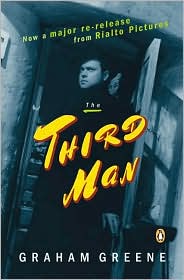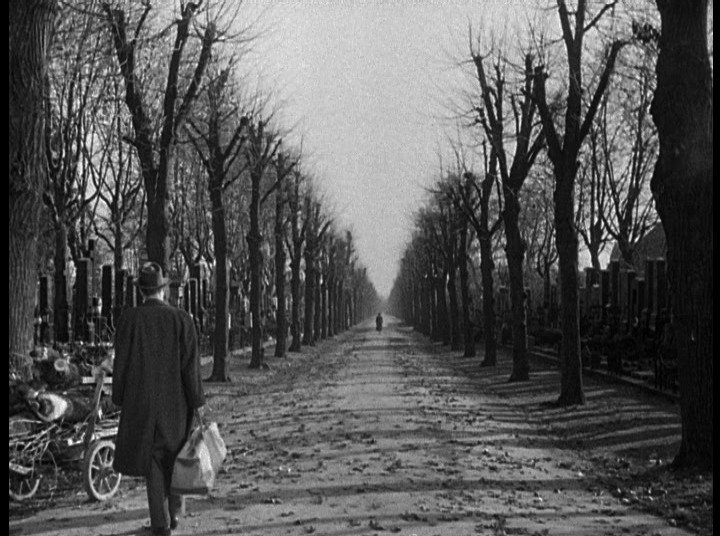
We open on Rollo Martins, a British dime western author, just off the plane from London. Rollo is in Vienna for the first time because he’s been offered a job from lifelong friend Harry Lime, whom Martins worships. Martins is shocked and dismayed to discover that Lime was killed only days ago and that the police, as represented by Sergeant Calloway our narrator, have him pegged as a racketeer. Martins, disappointed that his once and current hero could be so easily dismissed as a criminal makes like one of his western characters and starts looking for retribution for the libel of Calloway and for his friend’s supposed death. Thus we are introduced to the characters that help Martins and the reader get to the bottom of things.
The existential nature of the book comes out right away. “I’m going to make you look the biggest bloody fool in Vienna. There’s one dead man you aren’t going to pin your unsolved crimes on (Greene 32),” says Martins to Calloway, both men arrogant enough to believe he has the answers to both the racketeering and the murder without all the facts. In fact it is the initial impression of each character which determines their fate. As Sartre says “Man is nothing else but what he purposes, he exists only in so far as he realizes himself, he is therefore nothing else but the sum of his actions.” Everyone of Martins assumptions will be shot down piecemeal, and Calloway’s right with them. And for our deliciously noirish catalyst, the doorman who opens the investigation by explaining to Martins that Harry was killed on impact during the car accident is himself murdered by Harry when Martins sleuthing goes too far. This is but our first taste of the mammoth string of reversals about to take place.
Because Martins relies heavily on both his own nose for sniffing out facts and his love of the Harry Lime he thought he know, both will be proven dead wrong. After speaking to one of Lime’s associates, Cooler, he determines he’s on the level because of his impression of the man; this is wrong. When he meets Lime’s girlfriend Anna, he falls in love with her and finds himself bold enough to suggest he might take Harry’s place; this backfires. He comes to Vienna to begin a new life with Harry, and leaves only after having killed him and soiled his memory. This karmic irony is not limited solely to Martins, of course, nearly everyone gets a turn. Anna spends the length of the novel pining for Harry’s return from the afterlife to comfort her as he once did, “He used to look in, and when I heard your ring, just for a moment, I thought… (Greene 80)” When Martins finds that Harry is still alive, he couldn’t have less concern for her well-being, and in fact he all but gives her away to his schoolhood friend. Calloway, so happy to know that Harry is dead, doesn’t consider that it could have been a set up and has to tango with his nemesis once again. Harry, for all his cleverness in faking his own death, concludes the round of existentialist fate dispensing by attending his second funeral in casket.

Sartre’s positing that “the coward makes himself cowardly, the hero makes himself heroic; and that there is always a possibility for the coward to give up cowardice and for the hero to stop being a hero (Sartre),” shows itself in the reversal of expectations on the parts of Harry, Anna, Calloway, and Martins. Martins has his expectations tarnished by all of the characters that surround him on his stay in Vienna. Calloway, the heel whom he takes a swing at and calls stupid, is his only friend when the curtain falls. Anna, with whom his only connection initially is a mutual love of Harry, turns the tables on his impression of her as a damsel in distress when she rebukes his advances and abandons him at Harry’s funeral (Greene 156). Harry, whom he freely admits to loving becomes an abstract murderer (in his remarkable speech about little dots, starkly reminiscent of Sartre’s allegorical military leader) and then a very concrete one when he shoots at Martins in the sewer during the book’s climax, misses and kills a police officer instead. Martins himself experiences a meta-theatrical version of this drop in expectations when he hilariously impersonates an author who shares his penname at a conference full of high-minded intellectuals. Though the host laughs at Martins implication that Zane Grey the pulp novelist is one of the greatest living authors and though they are shocked to learn he’s never heard of James Joyce, the audience hangs on his every word until they discover he is not who they thought he was (Greene 94). Everyone whom we are told will be ‘heroic’ will become ‘cowardly’ before too long, Martins himself included. As Sartre points out, “there is no God…which can adapt the world and all its possibilities to my will. (Sartre)” Everyone has to discover the cruel realities of the world by seeing their version of it crumble in their hands like the proverbial cookie.
The Third Man is full of twists and turns, action, political intrigue, romantic inclinations, militaristic confusion, and gallows humour and so it’s easy to let the book’s existential nature take a back seat to everything else. Greene’s tragic heroes fall neatly in line with many of Sartre’s claims about existentialism and go a long way toward proving the latter man’s claim that “the destiny of man is placed within himself (Sartre)”. Calloway gets the shot at proving his theories about Harry he didn’t have when his enemy’s death left it ambiguous. Anna really does find herself in the same dreadful state she imagined she was in, only after she comes to terms with what Harry really meant to her. Harry, the laid back murderer who believes himself the cool orchestrator of all things dies hopelessly by the one man he thought to include in his scheme; he abandons his friends for his murderous, money-loving impulses, and so is left with very alone in the end. Martins, who has set out to vindicate his friend and prove his own worth, (as he begins as the epitome of worthless (only five pounds sterling in his pocket [Greene 17])) must destroy what he loves. He must kill Harry, whose ambiguous actions Sartre explains simply “vanish like water into sand”, which Harry literally does in the book’s climax when he falls into the rushing sewerage. And so, too does Martins vanish, out of Calloway’s sight after Harry’s second funeral, and out of the book.

Sartre, Jean-Paul, L'existentialisme est un Humanism. Translation by Philip
Mairet, 1946. First appeared in Existentialism and Humanism, Meuthen & Co., Ltd., London. < http://jya.com/sartre-eih.htm>
Greene, Graham. The Third Man. 4th ed. New York, NY: Penguin, 1999.

4 comments:
Hey Giff,
would you like to write duel Cat People reviews?
yes I would love to! I have to go now but I'll try and get in contact with you soon. I'll also try to watch curse of the cat people this weekend.
Curse is delightful. I saw a film recently with shades of Curse present throughout.
it's that swedish vampire film I wrote about a few weeks ago, Let The Right One In.
Post a Comment